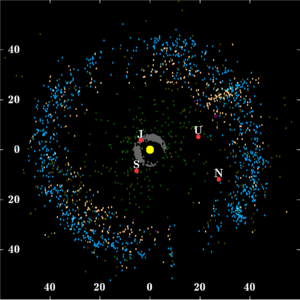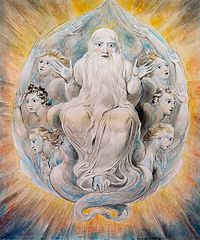Aupmanyav
Be your own guru
Oh yeah, that is talking about astronomy, but "primitve astronomy". There could be suns with more or less than seven planets. Even our sun has many planets, though considering their size and nearness to earth, we say there are eight planets. The Kuiper belt is a repository of thousands of small planets.
"When thou gazeth at the planets with the naked eye, without the interposition of magnifying mirrors, they will appear to be in seven degrees."
"The Kuiper belt occasionally called the Edgeworth-Kuiper belt, is a circumstellar disc in the outer Solar System, extending from the orbit of Neptune (at 30 AU*) to approximately 50 AU from the Sun. It is similar to the asteroid belt, but is far larger - 20 times as wide and 20 to 200 times as massive. .. In 1992, Albion was discovered, the first Kuiper belt object (KBO) since Pluto and Charon. Since its discovery, the number of known KBOs has increased to over a thousand, and more than 100,000 KBOs over 100 km (62 mi) in diameter are thought to exist." Kuiper belt - Wikipedia
*AU: Astronomical unit, roughly the distance from Earth to the Sun, stndardized at about 150 million kilometres (93 million miles).
"Pluto fails to meet the third condition. Its mass is substantially less than the combined mass of the other objects in its orbit: 0.07 times, in contrast to Earth, which is 1.7 million times the remaining mass in its orbit (excluding the moon). The IAU (International Astronomical Union) further decided that bodies that, like Pluto, meet criteria 1 and 2, but do not meet criterion 3 would be called dwarf planets. In September 2006, the IAU included Pluto, and Eris and its moon Dysnomia, in their Minor Planet Catalogue, giving them the official minor planet designations "(134340) Pluto", "(136199) Eris", and "(136199) Eris I Dysnomia". Had Pluto been included upon its discovery in 1930, it would have likely been designated 1164, following 1163 Saga, which was discovered a month earlier."
"In 2010, Gonzalo Tancredi presented a report to the IAU evaluating a list of 46 candidates for dwarf planet status based on light-curve-amplitude analysis and the assumption that the object was more than 450 kilometres (280 mi) in diameter. Some diameters are measured, some are best-fit estimates, and others use an assumed albedo of 0.10. Of these, he identified 15 as dwarf planets by his criteria (including the four accepted by the IAU), with another nine being considered possible. To be cautious, he advised the IAU to "officially" accept as dwarf planets the top three not yet accepted: Sedna, Orcus, and Quaoar. Although the IAU had anticipated Tancredi's recommendations, as of 2013, they have not responded."

"When thou gazeth at the planets with the naked eye, without the interposition of magnifying mirrors, they will appear to be in seven degrees."
"The Kuiper belt occasionally called the Edgeworth-Kuiper belt, is a circumstellar disc in the outer Solar System, extending from the orbit of Neptune (at 30 AU*) to approximately 50 AU from the Sun. It is similar to the asteroid belt, but is far larger - 20 times as wide and 20 to 200 times as massive. .. In 1992, Albion was discovered, the first Kuiper belt object (KBO) since Pluto and Charon. Since its discovery, the number of known KBOs has increased to over a thousand, and more than 100,000 KBOs over 100 km (62 mi) in diameter are thought to exist." Kuiper belt - Wikipedia
*AU: Astronomical unit, roughly the distance from Earth to the Sun, stndardized at about 150 million kilometres (93 million miles).
"Pluto fails to meet the third condition. Its mass is substantially less than the combined mass of the other objects in its orbit: 0.07 times, in contrast to Earth, which is 1.7 million times the remaining mass in its orbit (excluding the moon). The IAU (International Astronomical Union) further decided that bodies that, like Pluto, meet criteria 1 and 2, but do not meet criterion 3 would be called dwarf planets. In September 2006, the IAU included Pluto, and Eris and its moon Dysnomia, in their Minor Planet Catalogue, giving them the official minor planet designations "(134340) Pluto", "(136199) Eris", and "(136199) Eris I Dysnomia". Had Pluto been included upon its discovery in 1930, it would have likely been designated 1164, following 1163 Saga, which was discovered a month earlier."
"In 2010, Gonzalo Tancredi presented a report to the IAU evaluating a list of 46 candidates for dwarf planet status based on light-curve-amplitude analysis and the assumption that the object was more than 450 kilometres (280 mi) in diameter. Some diameters are measured, some are best-fit estimates, and others use an assumed albedo of 0.10. Of these, he identified 15 as dwarf planets by his criteria (including the four accepted by the IAU), with another nine being considered possible. To be cautious, he advised the IAU to "officially" accept as dwarf planets the top three not yet accepted: Sedna, Orcus, and Quaoar. Although the IAU had anticipated Tancredi's recommendations, as of 2013, they have not responded."

Last edited:

